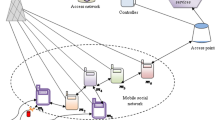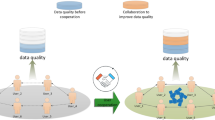Abstract
Mobile Crowd Sensing (MCS) has become a new archetype allowing individuals to effectively perform their sensing tasks by employing interested mobile users. This paradigm satisfies the requirements of the task requester, along with providing the willing participants with a way to generate profit by performing the specific tasks. Normally, an incentive is provided to the participants by the requester for processing the requested tasks. However, the requester may normally have a limited budget, so they prefer to make payments to the user providing good quality data instead of all the users participating in the process. Thus, selecting the most suitable user among the participant pool is required for executing the tasks efficiently in a short time. This paper presents an efficient online task allocation technique using a hybrid optimization approach. A novel Crow COOT Foraging Optimization (CCFO) algorithm is proposed for allocating tasks in MCS. The optimal user is chosen based on the fitness function devised using various aspects, like finish time, time of receiving task, time of sending task, makespan, monetary cost, ready time, and energy consumption. The CCFO algorithm is developed by modifying the C-BFO algorithm to the COOT algorithm to enhance the performance of the task allocation process. The presented CCFO technique for task allocation based on the fitness function evaluates makespan with the lowest value of 0.482.







Similar content being viewed by others
Data availability
The data underlying this article are available in Cambridge Haggle repository, at “https://crawdad.org/cambridge/haggle/20090529/” and UMass Diesel Net repository, at “https://crawdad.org/umass/diesel/20080914/”.
References
Ganti RK, Ye F, Lei H (2011) Mobile crowdsensing: current state and future challenges. IEEE Commun Mag 49(11):32–39
Yang D, Xue G, Fang X, Tang J (2015) Incentive mechanisms for crowdsensing: Crowdsourcing with smartphones. IEEE/ACM Trans Networking 24(3):1732–1744
Luo T, Kanhere SS, Das SK, Tan HP (2015) Incentive mechanism design for heterogeneous crowdsourcing using all-pay contests. IEEE Trans Mob Comput 15(9):2234–2246
Yucel F, Yuksel M, Bulut E (2021) Coverage-aware stable task assignment in opportunistic mobile crowdsensing. IEEE Trans Veh Technol 70(4):3831–3845
Wang J, Wang L, Wang Y, Zhang D, Kong L (2018) Task allocation in mobile crowd sensing: State-of-the-art and future opportunities. IEEE Internet Things J 5(5):3747–3757
Duan Z, Li W, Zheng X, Cai Z (2019) Mutual-preference driven truthful auction mechanism in mobile crowdsensing. In Proceedings of 2019 IEEE 39th International Conference on Distributed Computing Systems (ICDCS), IEEE. 1233–1242
Yucel F, Yuksel M, Bulut E (2020) QoS-based budget constrained stable task assignment in mobile crowdsensing. IEEE Trans Mob Comput 20(11):3194–3210
Xie Z, Hu L, Huang Y, Pang J (2021) A semi-opportunistic task allocation framework for mobile crowdsensing with deep learning. Wirel Commun Mob Comput 2021:1–15
Chen Y, Lv P, Guo D, Zhou T, Xu M (2017) Trajectory segment selection with limited budget in mobile crowd sensing. Pervasive Mob Comput 40:123–138
Shao Z, Wang H, Zou Y, Gao Z, Lv H (2022) A Task assignment method based on user-union clustering and individual preferences in mobile crowdsensing. Wirel Commun Mob Comput 2022:1–15
Xiao M, Wu J, Huang L, Cheng R, Wang Y (2016) Online task assignment for crowdsensing in predictable mobile social networks. IEEE Trans Mob Comput 16(8):2306–2320
Rahman MA, Hossain MS (2017) A Location-Based Mobile Crowdsensing Framework Supporting a Massive Ad Hoc Social Network Environment. IEEE Commun Mag 55(3):76–85
Cai H, Zhu Y, Feng Z, Zhu H, Yu J, Cao J (2018) Truthful incentive mechanisms for mobile crowd sensing with dynamic smartphones. Comput Netw 141:1–16
Wang Z, Hu J, Lv R, Wei J, Wang Q, Yang D, Qi H (2018) Personalized privacy-preserving task allocation for mobile crowdsensing. IEEE Trans Mob Comput 18(6):1330–1341
Lin Y, Cai Z, Wang X, Hao F, Wang L, Sai AMVV (2021) Multi-round incentive mechanism for cold start-enabled mobile crowdsensing. IEEE Trans Veh Technol 70(1):993–1007
Gao H, Zhao H (2022) A Personalized Task Allocation Strategy in Mobile Crowdsensing for Minimizing Total Cost. Sensors 22(7):2751
Wang Y, Yan Z, Feng W, Liu S (2020) Privacy protection in mobile crowd sensing: a survey. World Wide Web 23(1):421–452
Naruei I, Keynia F (2021) A new optimization method based on COOT bird natural life model. Expert Syst Appl 183:115352
Askarzadeh A (2016) A novel metaheuristic method for solving constrained engineering optimization problems: crow search algorithm. Comput Struct 169:1–12
Das S, Biswas A, Dasgupta S, Abraham A (2009) Bacterial foraging optimization algorithm: Theoretical foundations, analysis, and applications. Stud Comput Intell 3:23–55
Lin X, Wang Y, Xie Q, Pedram M (2014) Task scheduling with dynamic voltage and frequency scaling for energy minimization in the mobile cloud computing environment. IEEE Trans Serv Comput 8(2):175–186
Alkhalaileh M, Calheiros RN, Nguyen QV, Javadi B (2020) Data-intensive application scheduling on mobile edge cloud computing. J Netw Comput Appl 167:102735
Tang C, Xiao S, Wei X, Hao M, Chen W (2018) Energy efficient and deadline satisfied task scheduling in mobile cloud computing. In: Proceedings of 2018 IEEE international conference on big data and smart computing (BigComp), IEEE. pp 198–205
Elgendy IA, Zhang WZ, Liu CY, Hsu CH (2018) An efficient and secured framework for mobile cloud computing. IEEE Trans Cloud Comput 9(1):79–87
Cambridge Haggle dataset available at “https://crawdad.org/cambridge/haggle/20090529/” accessed on Aug 2022
UMassDieselNet dataset available at “https://crawdad.org/umass/diesel/20080914/” accessed on Aug 2022
Kumari N, Chauhan Tyagi I, Kumar H, Sharma D (2022) Tasks scheduling through hybrid genetic algorithm in real‑time system on heterogeneous environment. SN Comput Sci 3(1)
Kumar H, Tyagi I (2021) Hybrid model for tasks scheduling in distributed real time system. J Ambient Intell Humaniz Comput 12(1):2881–2903
Kumar H, Tyagi I (2020) Task allocation model based on hierarchical clustering and impact of different distance measures on the performance. Int J Fuzzy Syst Appl (IJFSA) 9(4):105–133
Sharma P, Shukla S, Vasudeva A (2021) Trust-based opportunistic network offloaders for smart agriculture. Int J Agric Environ Inf Syst 12(1):37–54
Gupta S, Agarwal G, Kumar V (2013) An efficient and robust genetic algorithm for multiprocessor task scheduling. Int J Comput Theory Eng 5(2):377–382
Funding
This research did not receive any specific funding.
Author information
Authors and Affiliations
Contributions
Sasi reka V conceived the presented idea and designed the analysis. Also, he carried out the experiment and wrote the manuscript with support from R. Shyamala Ramachandran All authors discussed the results and contributed to the final manuscript. All authors read and approved the final manuscript.
Corresponding author
Ethics declarations
Ethics approval
Not Applicable.
Consent to publish
Not Applicable.
Competing interests
The authors declare no competing interests.
Additional information
Publisher's Note
Springer Nature remains neutral with regard to jurisdictional claims in published maps and institutional affiliations.
Rights and permissions
Springer Nature or its licensor (e.g. a society or other partner) holds exclusive rights to this article under a publishing agreement with the author(s) or other rightsholder(s); author self-archiving of the accepted manuscript version of this article is solely governed by the terms of such publishing agreement and applicable law.
About this article
Cite this article
V, S., Ramachandran, S. Hybrid optimized task scheduling with multi-objective framework for crowd sensing in mobile social networks. Peer-to-Peer Netw. Appl. 17, 722–738 (2024). https://doi.org/10.1007/s12083-023-01608-4
Received:
Accepted:
Published:
Issue Date:
DOI: https://doi.org/10.1007/s12083-023-01608-4




